Abstract
To evaluate factors which might contribute to treatment failure in children with chronic constipation and soiling, we evaluated the history, physical findings, defecation dynamics, and anorectal function in 97 patients. We treated them with milk of magnesia, high fibre diet, and bowel training techniques and evaluated outcome at one year when 43% had recovered. Recovery rates were similar for boys and girls. Fifty seven per cent of the patients had not recovered. This group at the outset had more frequent soiling episodes, more severe constipation, were less likely to defecate water filled rectal balloons and to relax the external sphincter during defecation. In general girls had more severe constipation, abdominal pain, and a previous urinary tract infection than boys. Girls were more compliant during treatment and had less frequent soiling episodes at one year. Stepwise logistic regression showed that severe constipation, abnormal contraction of the external sphincter and pelvic floor during attempted defecation, and inability to defecate the 100 ml balloon in less than or equal to 1 min was significantly related to treatment failure. Defecation of smaller balloons, volumes for threshold of rectal sensation, critical volume and rectal contraction, and compliance with treatment could not predict treatment failure.
Full text
PDF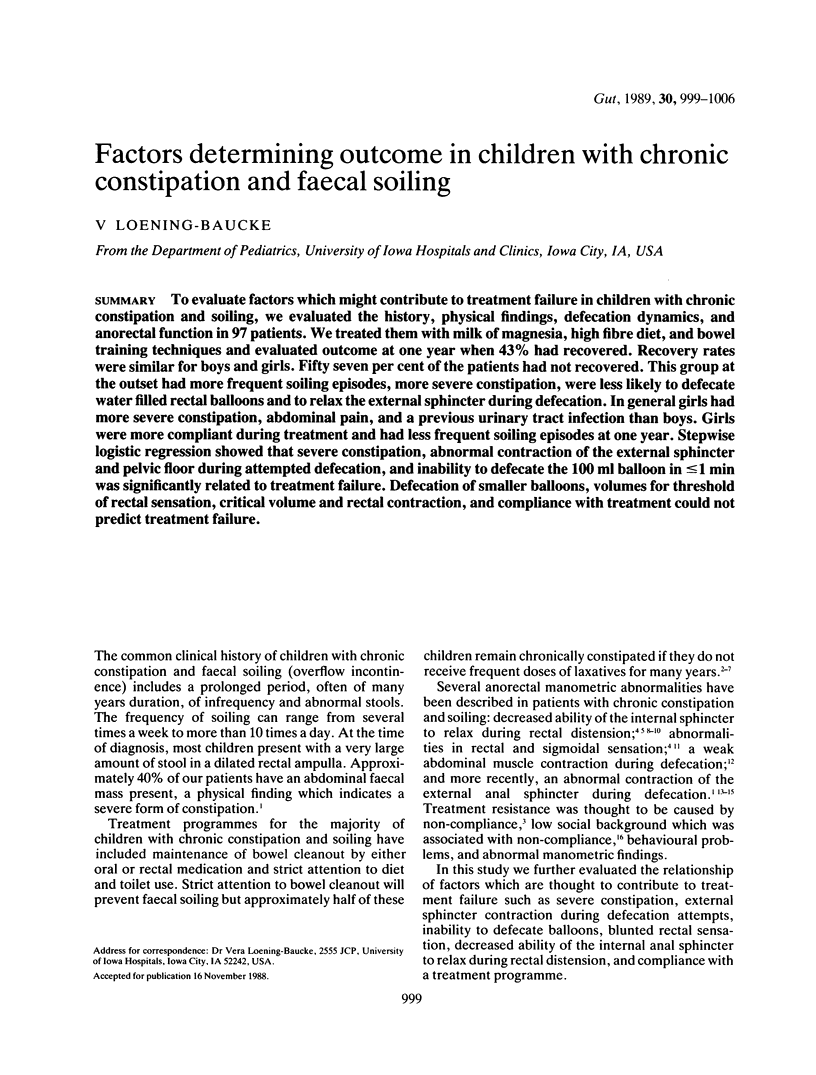
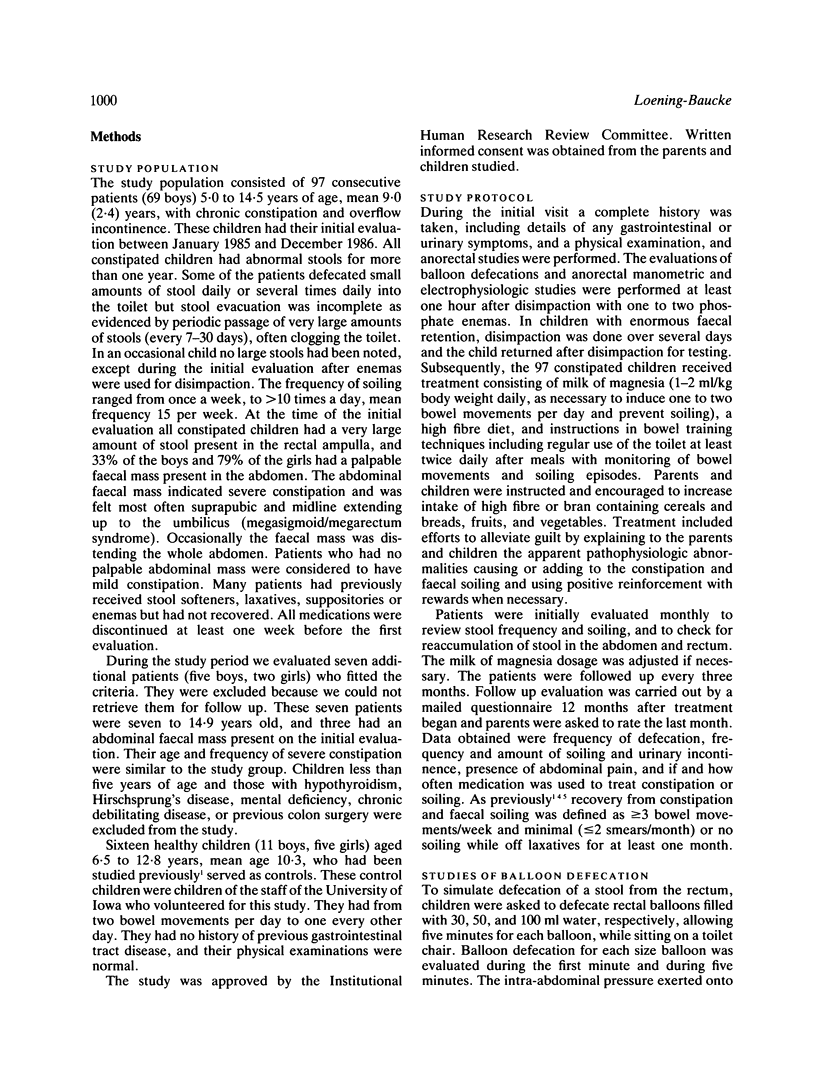
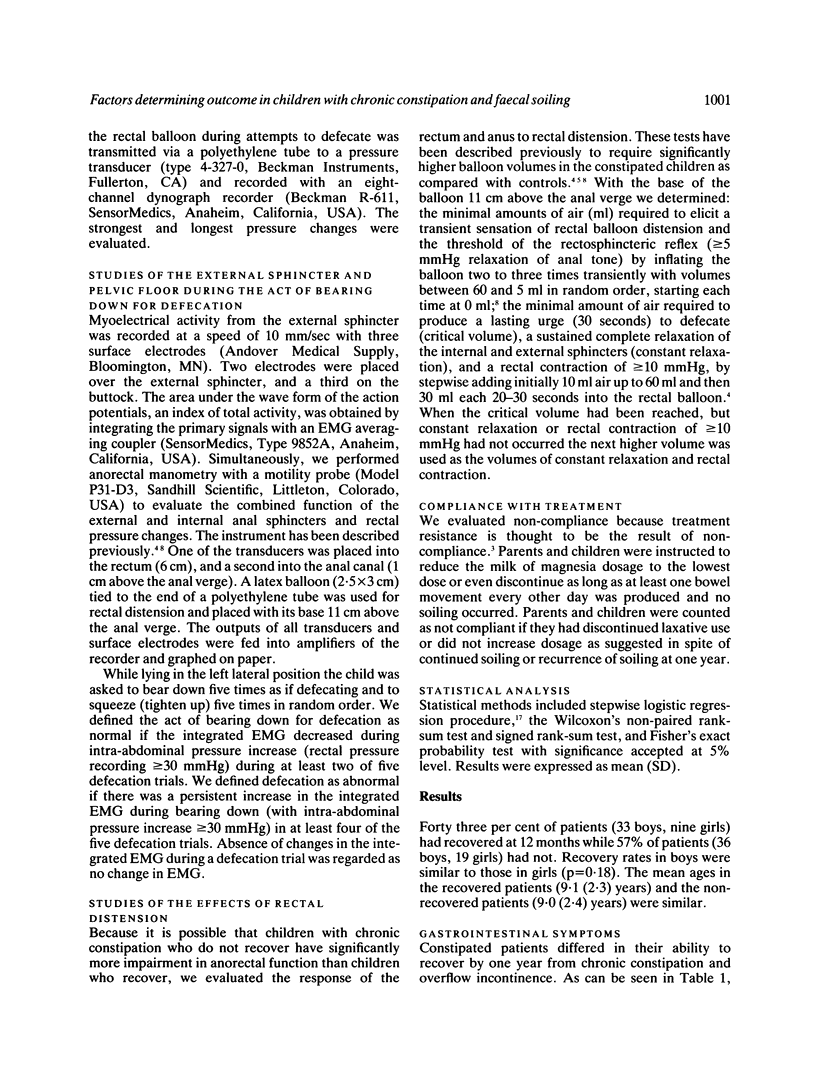
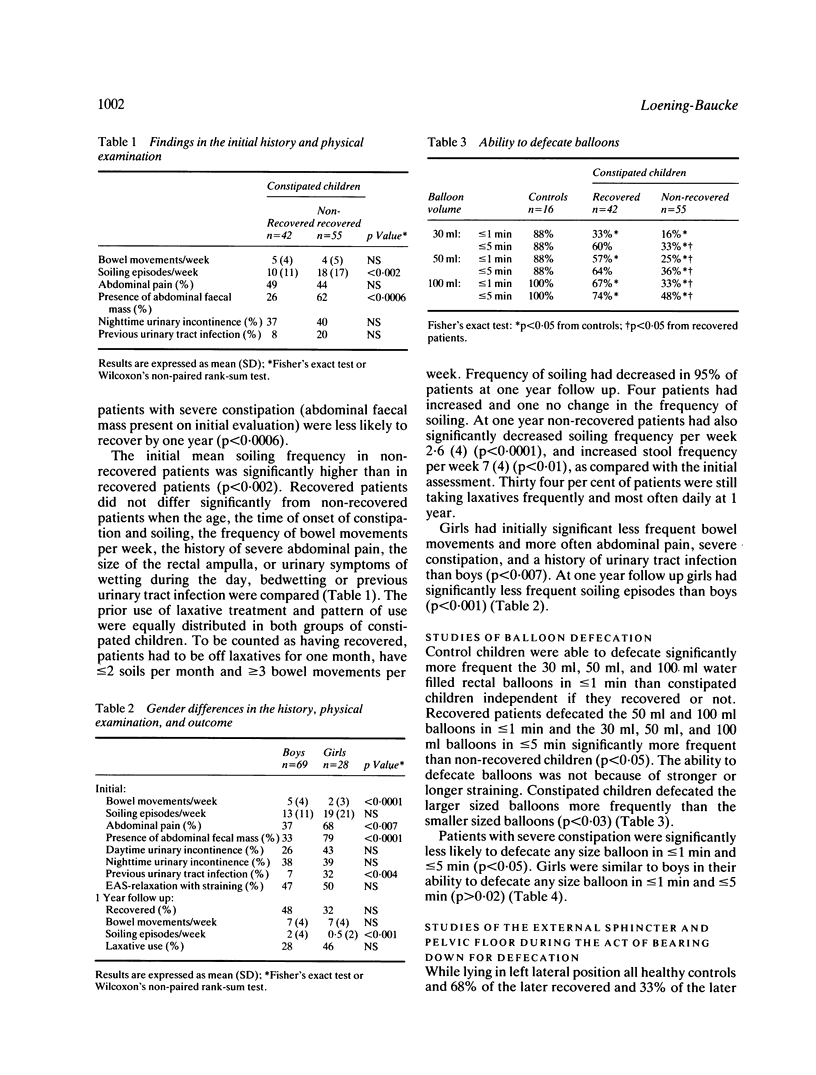
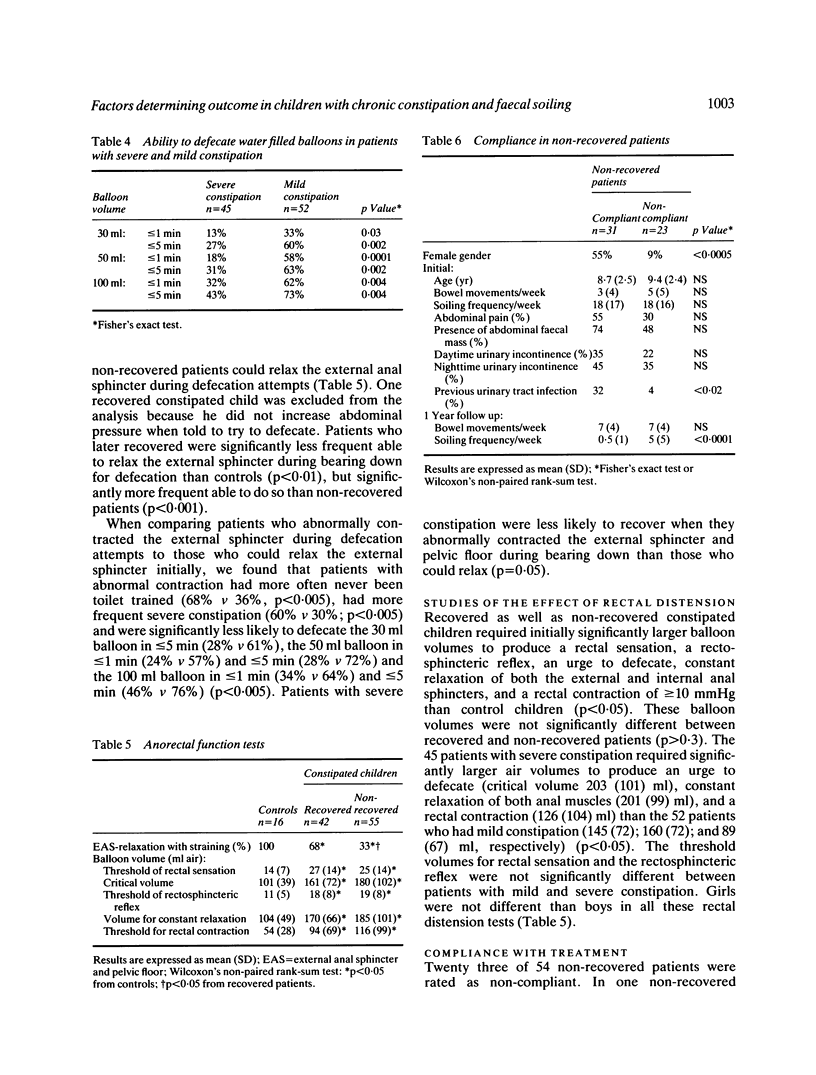
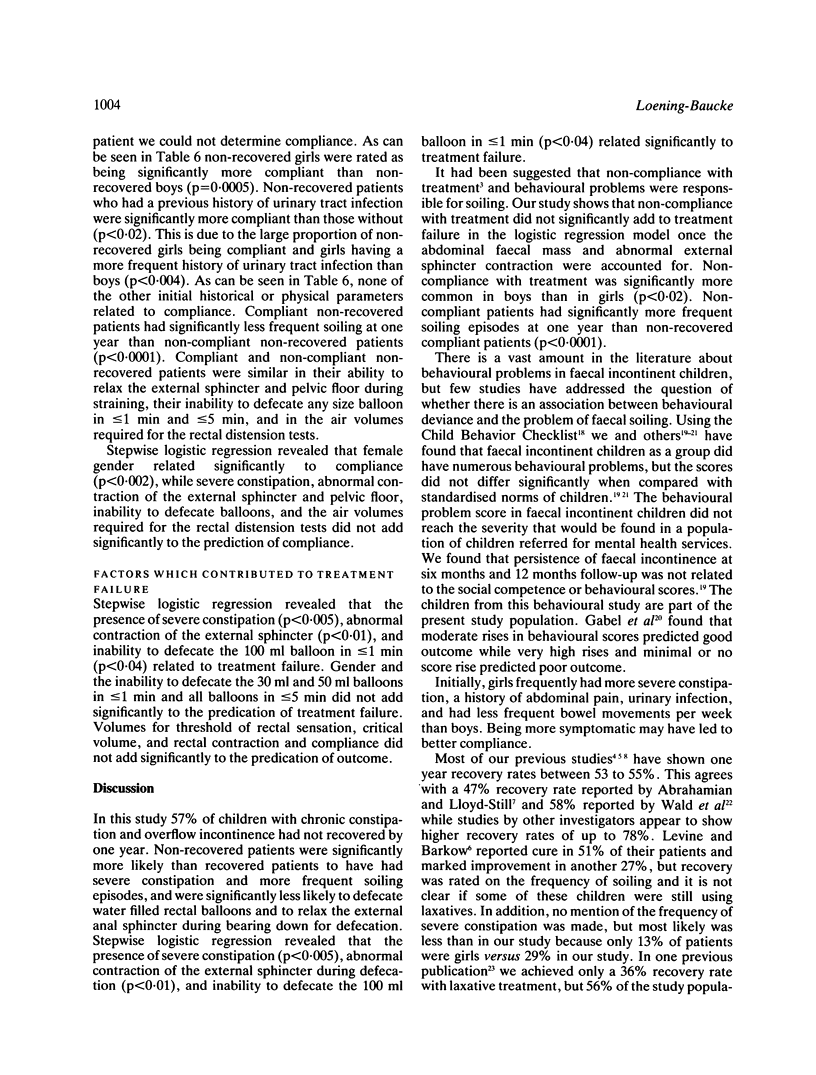
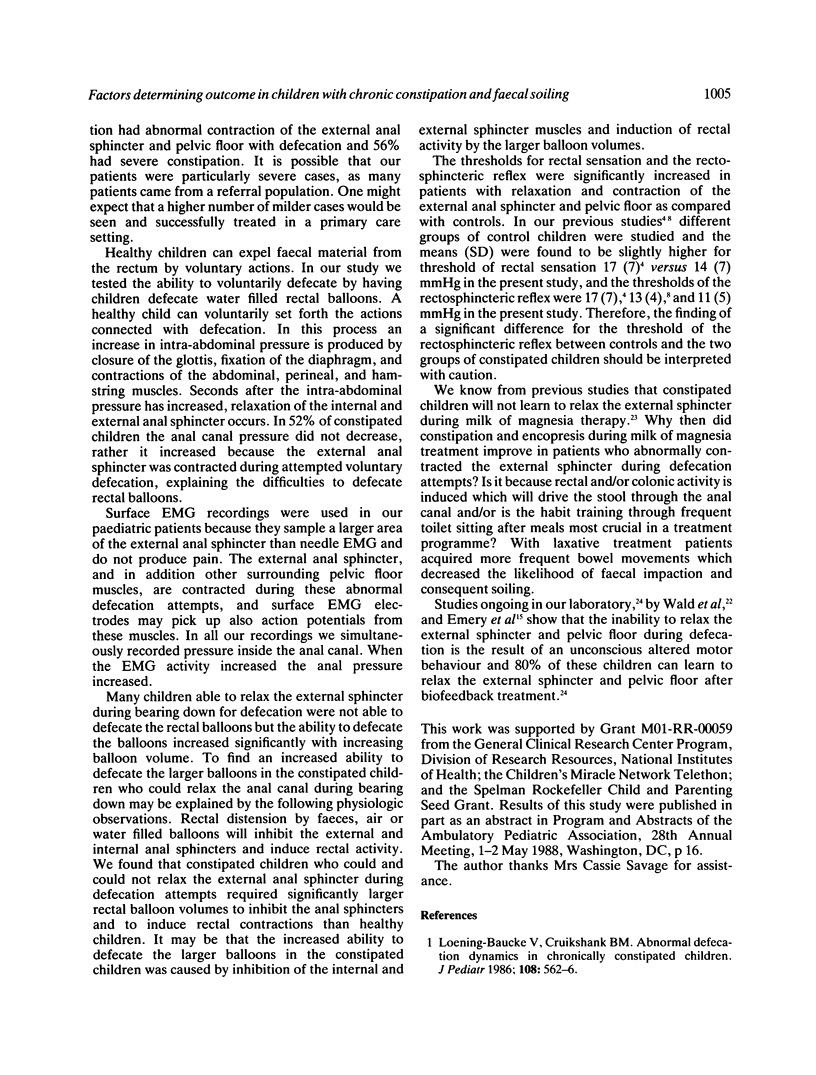
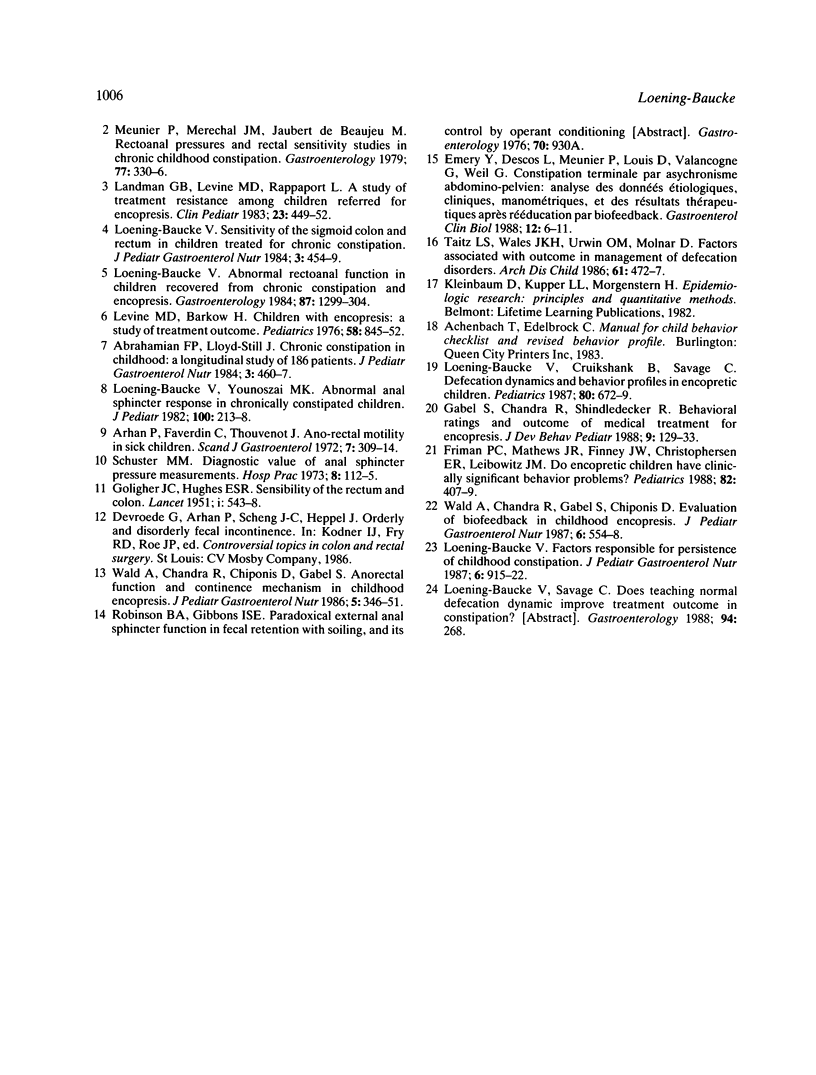
Selected References
These references are in PubMed. This may not be the complete list of references from this article.
- Abrahamian F. P., Lloyd-Still J. D. Chronic constipation in childhood: a longitudinal study of 186 patients. J Pediatr Gastroenterol Nutr. 1984 Jun;3(3):460–467. doi: 10.1097/00005176-198406000-00027. [DOI] [PubMed] [Google Scholar]
- Arhan P., Faverdin C., Thouvenot J. Ano-rectal motility in sick children. Scand J Gastroenterol. 1972;7(4):309–314. doi: 10.3109/00365527209180748. [DOI] [PubMed] [Google Scholar]
- Emery Y., Descos L., Meunier P., Louis D., Valancogne G., Weil G. Constipation terminale par asynchronisme abdomino-pelvien: analyse des données étiologiques, cliniques, manométriques, et des résultats thérapeutiques après réducation par biofeedback. Gastroenterol Clin Biol. 1988 Jan;12(1):6–11. [PubMed] [Google Scholar]
- Friman P. C., Mathews J. R., Finney J. W., Christophersen E. R., Leibowitz J. M. Do encopretic children have clinically significant behavior problems? Pediatrics. 1988 Sep;82(3 Pt 2):407–409. [PubMed] [Google Scholar]
- GOLIGHER J. C., HUGHES E. S. R. Sensibility of the rectum and colon. Its rôle in the mechanism of anal continence. Lancet. 1951 Mar 10;1(6654):543–547. doi: 10.1016/s0140-6736(51)92242-8. [DOI] [PubMed] [Google Scholar]
- Gabel S., Chandra R., Shindledecker R. Behavioral ratings and outcome of medical treatment for encopresis. J Dev Behav Pediatr. 1988 Jun;9(3):129–133. [PubMed] [Google Scholar]
- Landman G. B., Levine M. D., Rappaport L. A study of treatment resistance among children referred for encopresis. Clin Pediatr (Phila) 1984 Aug;23(8):449–452. doi: 10.1177/000992288402300808. [DOI] [PubMed] [Google Scholar]
- Levine M. D., Bakow H. Children with encopresis: a study of treatment outcome. Pediatrics. 1976 Dec;58(6):845–852. [PubMed] [Google Scholar]
- Loening-Baucke V. A. Abnormal rectoanal function in children recovered from chronic constipation and encopresis. Gastroenterology. 1984 Dec;87(6):1299–1304. [PubMed] [Google Scholar]
- Loening-Baucke V. A., Cruikshank B. M. Abnormal defecation dynamics in chronically constipated children with encopresis. J Pediatr. 1986 Apr;108(4):562–566. doi: 10.1016/s0022-3476(86)80834-4. [DOI] [PubMed] [Google Scholar]
- Loening-Baucke V. A. Factors responsible for persistence of childhood constipation. J Pediatr Gastroenterol Nutr. 1987 Nov-Dec;6(6):915–922. doi: 10.1097/00005176-198711000-00016. [DOI] [PubMed] [Google Scholar]
- Loening-Baucke V. A. Sensitivity of the sigmoid colon and rectum in children treated for chronic constipation. J Pediatr Gastroenterol Nutr. 1984 Jun;3(3):454–459. doi: 10.1097/00005176-198406000-00026. [DOI] [PubMed] [Google Scholar]
- Loening-Baucke V. A., Younoszai M. K. Abnormal and sphincter response in chronically constipated children. J Pediatr. 1982 Feb;100(2):213–218. doi: 10.1016/s0022-3476(82)80637-9. [DOI] [PubMed] [Google Scholar]
- Loening-Baucke V., Cruikshank B., Savage C. Defecation dynamics and behavior profiles in encopretic children. Pediatrics. 1987 Nov;80(5):672–679. [PubMed] [Google Scholar]
- Meunier P., Marechal J. M., de Beaujeu M. J. Rectoanal pressures and rectal sensitivity studies in chronic childhood constipation. Gastroenterology. 1979 Aug;77(2):330–336. [PubMed] [Google Scholar]
- Taitz L. S., Wales J. K., Urwin O. M., Molnar D. Factors associated with outcome in management of defecation disorders. Arch Dis Child. 1986 May;61(5):472–477. doi: 10.1136/adc.61.5.472. [DOI] [PMC free article] [PubMed] [Google Scholar]
- Wald A., Chandra R., Chiponis D., Gabel S. Anorectal function and continence mechanisms in childhood encopresis. J Pediatr Gastroenterol Nutr. 1986 May-Jun;5(3):346–351. doi: 10.1097/00005176-198605000-00002. [DOI] [PubMed] [Google Scholar]
- Wald A., Chandra R., Gabel S., Chiponis D. Evaluation of biofeedback in childhood encopresis. J Pediatr Gastroenterol Nutr. 1987 Jul-Aug;6(4):554–558. doi: 10.1097/00005176-198707000-00011. [DOI] [PubMed] [Google Scholar]


